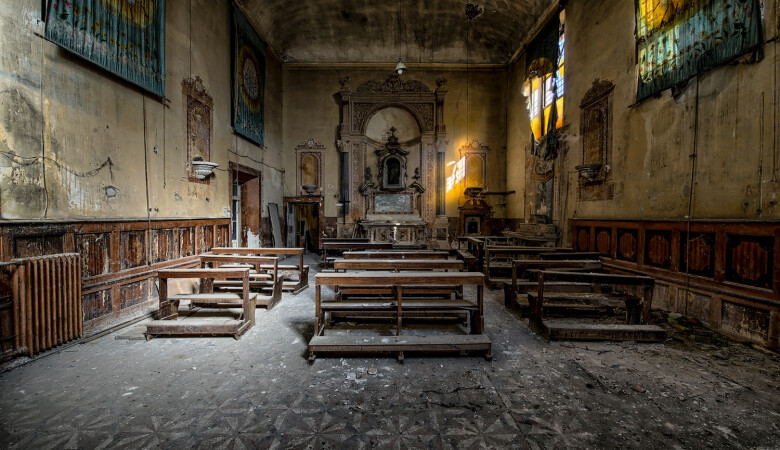The Elements of a True Spiritual Father (1 Corinthians Sermon 16)
January 27, 2019 | Andy Davis
1 Corinthians 4:15-21
Evangelism, Ministry, Marriage and Parenting
The Portrait of a True Gospel Minister
One of the things that I like to do as I travel through different cities is go to art museums. Now, some of you would be very excited about that. Others wonder, "why in the world would one want to spend their afternoon in an art museum?" But I do. I'm not talented at all as an artist, but I like to see skillful art. I like to see the way that especially painters are able to capture light and show faces and things like that. And so a number of years ago and actually a couple of times I've been to The Rijksmuseum in Amsterdam and I've seen the work of the Dutch masters. And they are able to capture with just incredible skill portraits of faces.
And you can just see that different individuals leaders, people that don't maybe mean anything to me as an American, but they're part of Dutch history or just perhaps even random individuals from society. And just the ability to capture a look, a gleam in an eye facial expression. Obviously the most famous of all these is not in Amsterdam, but in the Louvre, the Mona Lisa, the ability to capture the look on her face and what in the world she was thinking about and how she's able to look at you as you walk from left to right. I don't know how that can be, but that's the skill of a portrait artist.
John Bunyan in his spiritual allegory, his classic Pilgrim's Progress uses this image as Christian goes to a place called Interpreter’s House at the beginning of his pilgrimage from the City of Destruction to the Celestial City, he is shown by the interpreter many scenes or vignette's, or different things that will help him in his journey. It's going to be a very dangerous journey the Christian life is a dangerous journey and the first thing that interpreters shows him is a portrait. A framed picture and this is how it's described. Interpreter showed him Christian, a picture of a very grave that means a serious person hang up against the wall, and this was the fashion of it.
"It had eyes, lift up to heaven, the best of books in his hand, the law of truth was written upon his lips, the world was behind his back. It stood as if it pleaded with men, and a crown of gold did hang over his head." So, Christians there looking at this portrait. This picture up on the wall. Then said Christian, "What means this?"
Interpreter answered, "The man who's picture this is, is one of a thousand. He can beget children, he can travail in birth with children and nurse them himself, when they are born. And whereas thou seeth him with his eyes, lift up to heaven, the best of books in his hand, and the law of truth writ on his lips, it is to show thee that his work is to know and unfold dark things to sinners. Even as thou also seeth him stand as if he pleaded with men and whereas thou seeth the world as cast behind him and that a crown hangs over his head, this is to show thee that sliding and despising the things that are present in this world for the love that he hath to his master service he is sure in the world to come next to have his glory for his reward."
Now said the interpreter, "I have showed thee this picture first because the man whose portrait this is, is the only man whom the Lord of the place whether thou art going have authorized to be thy guide and all the difficult places, thou mayest meet with on the way."
So this is the Puritan portrait of a Godly pastor. And as you look at that, this is the guide that you will need as you make your way along the way. This is the first thing that the interpreter wanted to show Christian. And look at the descriptions, one of a thousand. This is a rare individual. He's grave, serious in demeanor, like a powerful warrior. Life is serious, and like Jesus was a man of sorrows and familiar with suffering so this individual is a serious-minded person. He understands there's a war going on. He is able, it says to beget children, to travail in birth with children. A bit of a strange image. We'll talk more about it in a moment, but he's able to nurse them up after they're born.
He has his eyes lifted up to Heaven, he's heavenly minded. And he has the world cast behind his back, he thinks very little of the honors and privileges and rewards of this world. He despises the lust of this world and its worldly prizes. And he has the law of truth in his lips meaning he speaks the word of God consistently he has the best of books, the 'book of book's in his hands, namely the Bible. And he unfolds deep mysterious things doctrines from the Word of God. He's a faithful teacher, of the Word of God. And He's got a crown of gold over his head, namely he has a future eternal reward for all his labors.
Now for me, as a pastor, I look at this and I think this is an incredibly challenging image. "How could I ever live up to this portrait?"
Paul Was a True Spiritual Father
But the more that I look at it, I think there is one man that lived up to it, better than anyone that has ever been in church history, and that is the apostle Paul. And Paul here gives us in this text, that you just heard Chris read, basically a portrait of a spiritual leader or guide or perhaps better right from the text, a spiritual father. And what's amazing is Paul's fathering of souls, has continued across the centuries, through the Word that He wrote through 1 Corinthians through Romans through all of the things that God laid in his heart, he is able to continue to, in some amazing way, beget children, raise them up and train them. He's also a challenge to all that would like to be, yearned to be, spiritual leaders in their generation, that we would live up to this portrait.
Paul Uses Many Metaphors for the Ministry
Now, Paul uses a lot of images for the pastoral ministry, there's a lot of different things even in 1 Corinthians. For example, the image of being a servant or a slave. First Corinthians 3:5. "What after all is Apollos? What is Paul, only servants? Through whom you came to believe, as the Lord assigned to each his task." So, a pastor, a godly leader is a servant.
Also farmers. He's got a farming image here. "I planted the seed, Apollos watered, but God made it grow." Also got an architectural or kind of a construction image, a building image. In 1 Corinthians 3:10. He says, "By the grace God gave me, I laid a foundation as an expert builder. Someone else is building on it."
Also we got the image in chapter 4 the beginning of this same chapter, of stewards. That's a servant with a special task who's managing the master's possessions or property. So look at verses 1-2, he says "This is how one should regard us as servants of Christ." I already covered that. But also "stewards of the mysteries of God. Moreover, it is required of servants or stewards that they be found trustworthy." Later in this book, he will talk about himself as a witness, somewhat like at a court trial. We get this in Acts chapter 1:8 "You will receive power when the Holy Spirit comes on you and you will be my witnesses." So Paul talks about in the 1 Corinthians 15:15, he basically said, "We were witnesses of Christ that God raised Him from the dead." So witnesses.
Also the image of shepherds comes across in Paul's language frequently, especially in Acts 20:28 when he gathered the elders from the church at Ephesus, and He said, "Be shepherds of the church of God, which He bought with His own blood." So there's that image of being an overseer or shepherd. In 2 Timothy 1 he uses the image of a herald. A herald will be somebody who comes into the town square and announces news from a king. He also in 2 Corinthians 5, uses the image of an ambassador, someone who is the official representative of a distant King. All of these are images of the pastoral ministry.
But here he's got, I think, the most emotionally poignant one, the most powerful one, and that is of a spiritual father. Look what he says in verse 15, "Even though you have 10,000 guardians in Christ, you do not have many fathers for in Christ Jesus, I became your father through the gospel."
Father: A Picture of Committed Love PLUS Authority
So this is a picture of committed love, plus fatherly authority. We're going to talk about that in the verses that you just heard. Paul is laboring here to re-establish his spiritual authority to speak into the lives of the Corinthian Christians. He has the right to speak into their lives, he has the right to evaluate their behavior and to speak words of judgment and give disciplines as an authority figure, as a father. There were some in that Corinthian church that were questioning Paul, they were challenging him, pushing back at him. It wasn't enough that they said "I follow Apollos… or "I follow Cephas…" or "I follow Christ…" they said "I don't follow Paul." And so he's got to deal with a faction, a group within the church that's becoming increasingly hostile to him, anti-Paul.
And he deals with it openly throughout pretty much the whole of 2 Corinthians. He's establishing, throughout that whole book his reputation, his right to give commands his, his ministry as over against a group of false teachers who Paul says they are like masquerading as servants of righteousness like an angel of light, like Satan masquerading as an angel of light. So these are false teachers but then there are others that weren't false teachers either way, they just were Corinthian Christians who were doubting Paul, challenging him and increasingly unable to hear from him and because of Paul's unique role in redemptive history, the apostle of Jesus Christ to the Gentile world. It was vital for them to be able to continue to drink in truth from this spiritual father to be able to sit at Paul's feet, and drink in truth from him. And to not push back. And so it is vital for us I think to continue to be ministered to by Paul, God entrusted a lot of controversial topics to Paul. A lot of them are right in this book.
Like I said, if I go verse by verse, and you stick with me, at some point, I will offend each one of you, I don't intend to, but it's just the nature of the kind of topics that are covered in 1 Corinthians. God gave Christ gave to Paul a lot of heavy lifting to do a lot of controversial issues and so therefore there's frequently a push back against Paul. I don't like Paul. And so that was going on in the Corinthian church. Beyond that however, there is the importance for us to understand these elements or these aspects of being a spiritual father because it's the lasting pattern that we can, to some degree, inherit if we're going to be spiritual leaders as well. The Lord is pouring into our geographical region more and more people. They are pouring in here, by the hundreds and by the thousands. And many of them are un-church, many of them are unbelievers.
And the only spiritual dynamic that's going to be suitable or sufficient to meet these rising numbers in this great challenge, a great opportunity for us is spiritual multiplication and by spiritual multiplication. I mean, we are able to lead individual people to Christ, and then mentor them or disciple them and raise them up to maturity so that they can do the same thing in the lives of others. And so, we have here, I think a lasting pattern for being a spiritual mentor or leader similar to the Apostle Paul. Now he'll be unique in history, but that we could follow that. So let's look at some of these elements.
I. A Spiritual Father Has Spiritual Children
And it begins, simply with this. A spiritual father has spiritual children.
You don't become a father until you have a child, and so you don't become a spiritual father until you have led someone to Christ. Look at verse 15, "Even though you have 10,000 guardians in Christ, you do not have many fathers for in Christ Jesus I became your father through the gospel." Now, the term he uses here translated guardians. Would be a slave in a large household who's entrusted specifically with the responsibility of training the future heir. The son who will inherit the mansion and all the property and he trains him, he's intelligent, this guardian he's pouring truth in him and He's preparing him for all of his social, financial, economic obligations. That was the Greek term that Paul uses here. He said, "You Corinthians, you have 10,000 of those. You have a lot of people who influenced you for Christ. But you have only one father."
Now that's what he's saying here. You have a lot of people who have... So I think he would say Apollos even Peter other individuals, gifted teachers, they are your influencers they are to some degree guardians but you have a unique relationship with your spiritual father and that's what he's claiming for himself. Paul came to Corinth as a trail blazing, frontier church planting apostle to the Gentiles. And he, by faithful preaching, of Christ and him crucified, laid the foundation for that church. He is not claiming to be their Savior He didn't shed his blood for their sins. He wasn't raised from the dead on the third day he is not the savior of the world. He proclaimed Christ crucified and resurrected as their only savior. But in that he had a unique role at the human level of seeing them come to Christ. Furthermore, we know that only through the ministry of the Holy Spirit, can anyone be born again.
The Holy Spirit alone can move someone from spiritual death to spiritual life, and so Jesus said that you have to be born of the Spirit in order to enter Heaven, you have to be born again born by the spirit. He said to Nicodemus. And so this is something only the Holy Spirit of God can do. No human individual can do this. God saves sinners by sovereign... By His sovereign power. By the blood of Christ by the resurrection of Christ, by the power of the Holy Spirit of God that's how God sovereignly saves sinners. But He uses human servants in that process, and He used Paul in bringing these Corinthian Christians to saving faith. He was their spiritual father in the Gospel.
Now, Paul fathered many children. Everywhere he went, he fathered spiritual children, and he uses this image frequently. For example, in Galatians 4, I think this is exactly where Bunyan got his image that this man, this warrior is able to give birth to children and travail and birth over them until they're developed. I think he's taken that right from Galatians 4. Where that church in Galatia was dealing with false doctrine, that Judaizers the false doctrine in Galatia... That the Galatians were being drawn in by. And this... He uses the language, Galatians 4:19-20, "My dear children for whom I am again in the pains of child birth until Christ is formed in you, how I wish I could be with you now and change my tone because I am perplexed about you." Is an amazing image for Paul to use. And he says, again, "I was in child birth with you the first time, and now it seems I've got to do that all over again."
He's also the spiritual father of many churches, not just this Corinthian church, but for example, the Thessalonian Church. 1 Thessalonians 2:11-12, he says, "You know that we dealt with each of you as a father deals with his own children, encouraging, comforting you, and urging you to live lives worthy of the God." So he was their spiritual father and he dealt with them gently and lovingly. He's also the spiritual father of individuals. For example, Onesimus the runaway slave who bumped into Paul in Rome. And Paul in the little letter to Philemon in Verse 10 he says, "I appeal to you for my child, whom I fathered while I was in chains, Onesimus." It's pretty powerful. He also calls right in this text, Timothy, his own son, and he does that many times, and he calls Titus his spiritual son.
So Paul by faithfully preaching the gospel was privileged to lead countless souls to Christ, and in that way, he would say he became their spiritual father. So let me just stop and apply that to us, to you, to each one of us. Have you done this? Have you been able to be a spiritual parent, a father, or mother, to lead someone, an individual, to Christ, It's an incredible privilege. It's never going to be, you alone if you're the one there when they're born again be assured the Lord's been working in them for days, weeks, months, years, before you. But what a great joy it is to be there at the moment of life. Because especially, it's not just that, but then you have a responsibility an obligation then to disciple that person to train them up, but what a great joy. Has that ever happened to you? Have you ever been able to lead someone to Christ? And if not, I just want to create inside of you a yearning that that would happen. Oh God, in 2019 let me lead someone to Christ. Please give me the opportunity to see someone cross over from death to life, from darkness to light. I just want to... I want to be there when it happens. Well, in order for that to happen, you got to share the gospel.
You got to share the Gospel with people and it's like, "Oh God, I would love that to happen." So that's a yearning I have inside my heart and for each one of you. Every Mother's Day, we have a baby dedication. One of my favorite times... It's a... It's a fun time, it's a noisy part of our service. You guys know exactly what I'm talking. It's really fun. It's all the parents of babies that were born in the past year are standing there and get a chance to have their babies pray for. I think our church is very fruitful. Have you noticed? We're a fruitful church. Alright, praise God, that's awesome. But wouldn't it be awesome to have just as many spiritual babes, baptized, water baptized and then discipled and trained in their first steps of Christian obedience? How sweet would that be? That's my desire.
II. A Spiritual Father Loves His Children
Secondly, a spiritual father loves his spiritual children. He has a tremendous tone of affection for them. Throughout 1 and 2 Corinthians, He clearly loves them. And He deeply loves these people, and they aren't easy to love. They are not easy. They are a dysfunctional church, they are prideful, they're fractious, they push back against Him, they give Him a lot of grief but He just clearly loves them. And you get that a lot in 2 Corinthians... 2 Corinthians 6:11-13, listen to this, "We have spoken freely to you Corinthians, our hearts are opened wide to you. We are not withholding our affection from you, but you are withholding yours from us. I speak as to my children as a fair exchange, open-wide your hearts to us also."
He loves them. He just wants them to love Him too, or again, later in that same book, 2 Corinthians 12, I love this, 14-15, "After all, children should not have to save up for their parents, but parents for their children." A number of you college students are saying "Amen." I think that's absolutely right. But it is right. Parents save up resources so they can bless their children with them. It's not called on the other way. And so Paul then says this, "So I'll very gladly spend for you everything I have and expend myself as well." "Because I'm a spiritual father who will give you everything I have." What's sad is that this church is not doing well spiritually. They're not walking in the Word that he taught them. So this is really very much the opposite of what John says in 3 John in Verse 4, where he says, "I have no greater joy than to hear that my children are walking in the truth." Well, Paul has the opposite sorrow here where he hears that these Corinthians are in many ways not walking in the truth and it brings him grief. They are struggling in their walk with Christ. Now Paul is willing to spend himself and to be spent for them.
III. A Spiritual Father Does Not Shame, But Warns His Children
Thirdly, a spiritual father does not shame, but warns His children. Look again at verse 14, we saw it last week, he said "I'm not writing this to shame you, but to warn you as my dear children."
Now part of the role of a wise spiritual father is to be willing to speak hard truths, when needed. But also he has to know when enough is enough, to not be too severe with them. Now, Paul, as we saw last week, has really laid into them in this chapter, really laid in. You remember last week as we went over these words in verses 8-13, "Already you have all you want, already, you have become rich, you've become kings, and that without us. How I wish that you really had become kings, so that we could be kings with you, for it seems to me that God has put us apostles on display, at the end of the procession, like men condemned to die in the arena. We have been made a spectacle to the whole universe, to angels as well as to men. We are fools for Christ, but you, you are so wise in Christ. We are weak, but you are strong. You are honored, we are dishonored. To this very hour, we go hungry and thirsty, we're in rags, we are brutally treated, we are homeless. We work hard with our own hands, when we are cursed we bless, when we're persecuted, we endure it, when we are slandered we answer kindly. Up to this moment, we have become the scum of the earth, the refuse of the world."
Now, if you hear that, you feel that is weighty. He is laying it into them, he is pressing on their consciences, he's worried about them, that they are becoming worldly and they care too much what their pagan Corinthian neighbors think and they want a comfortable easy life, prosperous, honored, easy, go to heaven. See and that's not the kind of life we're living, that's not what my life is like, Paul is saying. So he has turned it way up. Then in Verse 14, he turns it back down again, it's remarkable. Look again at verse 14, "I'm not saying this to shame you, but to warn you as my dear children." It's a remarkable statement. Now shame is a powerful thing in life, isn't it? It's one of the things we fear the most, public shame. It's a burning sense of public embarrassment of being exposed especially in the eyes of people you care about, whose opinion matters to you. Shame has a role in our sanctification, similar to physical pain in this life. Physical pain warns you that something's wrong. Stop leaning on that hot thing you're burning your hand or you've got some internal serious organic problem with yourself, you need to get treated. Pain does that, shame is similar spiritually in this world.
When we sin, we're supposed to take it seriously. There's supposed to be a burning sense of hatred for that so that we don't ever do it, again. There is a reasonable place for that. Do you remember when Peter the night that Jesus was arrested, denied, three times knowing that he hadn't ever heard of Jesus to the point of even calling down curses on himself. Then suddenly the rooster crows, he remembers which Jesus had predicted. Jesus is walking by being taken from one place to the other in bonds. He looks right at Peter, at the moment the rooster is crowing. I can't imagine what that felt like. And then he went outside and wept bitterly. What was he feeling at that moment? You can say shame is no part of my Christian life. Alright, give it another word then. But what was he feeling at that moment?
And did it play a role in the rest of his life? Jesus gently lovingly restored him, forgave him, re-established him in public ministry, but he never forgot that night. Never. It's like, "Oh God deliver me from fear, of man, deliver me from fear, of incarceration, deliver me from fear of death, deliver me so that I can be faithful in my preaching Ministry, of thee youth." So it had a role to play.
And yet Paul here says, "I'm not writing this to shame you." It's interesting because in the very next chapter, 1 Corinthians 5, it seems like he want them to feel ashamed, that's a church discipline passage, remember, where he says, "It's actually reported that there is someone among you that is sinning in a way that pagans don't even do, a man has his father's wife. And you were proud. Shouldn't you rather have been filled with grief?"
Alright, alright, filled with grief, but I can imagine Paul is saying, "You ought to be ashamed of yourselves, that you're tolerating this sin in your life, in your church," there's that sense. But you're like, "He doesn't use the word shame." Okay, fine. Go up to Chapter 6, Verse 5, and he says there about court cases within the church. He says, "Is this actually possible that there's no one amongst you wise enough to judge a case from Brother to Brother, so you have to go to the pagans? I say this to your shame." Oh, there it is. And he's going to do it again in Chapter 15 where he talked about the resurrection and there he says, "Come back to your senses, as you ought, and stop sinning, for there are some there who are ignorant of God. I say this to your shame." That's in the same epistle.
So why here in verse 14, does he say, "I'm not writing this to shame you but to warn you,"? because he knows he has come on strong. He knows he has turned it way up to level 10, and it's time now to back off. A godly father knows when enough is enough. He's going to warn his children, but then when he has made his point, he's going to back off. Lots of fathers err on each side of this equation. They're either too soft, and negligent and lazy and they don't address the sins of their children or they're way too harsh and really abusive, verbally, emotionally maybe even physically abusive.
You see this a lot, even in the sports world. I've been around some fathers that seem to be living their sports fantasies through their children and you guys know what I'm talking about. But I was reading about one major league baseball player named Rafael Palmeiro, and his father Jose, was this kind of a father. He was a senior in high school and he lashed a line drive 396 feet long, hit the middle of the wall and rolled. And he got a double. His father ran out in the field and said, "If you are any kind of man at all, you would have cleared that fence." On the field, in a varsity baseball game. And he did this his whole life. Every time you go two for four, his dad would call him and say, "What about the other two at-bats?" This is kind of man that he was. And Rafael Palmeiro said, "This drove me onto excellence." Yeah, well, it'll drive some people on excellence, other people it would be destructive. History is actually filled with abusive fathers who pour acid on their kids verbally, deprive them of affection, provoke them to wrath.
Paul wasn't that kind of a spiritual father but he did not neglect to warn them of the danger they were in. He just knew enough was enough.
IV. A Spiritual Father Sets the Example for His Children
Fourthly, a spiritual father sets the example for his children. Look at Verse 16, "Therefore, I urge you to imitate me." So much of the Christian life is caught as well as taught. I don't think that there's anything in the Christian life that's not taught first, and then caught. But there are just some things that you just live out, like you're instructed in the Word and then it's lived out. You should pray but then they watch Jesus praying and say, "Teach us to pray." And so there's that combination of example and then instruction. Jesus came to this world, primarily to die on the cross as an atoning sacrifice for our sins, that His blood would be shed on the cross. But friends, He could have done that in an afternoon. God could have incarnated Him as a fully grown man, orchestrated instantly, His death on the cross, raised Him from the dead on the third day and take Him back up to Heaven, but He had 30 years of perfect life before that, for a lot of theological reasons. But one of them is to give us "an example that we should follow in His steps." 1 Peter 2:21.
Paul knew the importance of example as well. In Chapter 11 in the same book, verse 1, he says, "Follow my example as I follow the example of Christ." So Paul set up his lifestyle as an example, for the Corinthians to follow. No one in history suffered as much for the Gospel as Paul. So he's not asking them to do anything, he's not living out. He's pointing to his example in terms of his suffering for the Gospel. Follow my example. So a spiritual father is willing to set his lifestyle before his children as an example. Children see right through hypocrisy, they just do, they just see right through, "Do as I say, not as I do." But a spiritual father is able to present his life, not perfectly, there are no perfect spiritual fathers, but that you practice what you preach. Now, Paul was so confident of his role modeling that he knew he couldn't go, but he was willing to send his number one spiritual son Timothy, in his place. Look at verse 17, "For this reason, I'm sending to you Timothy, my son whom I love, who is faithful in the Lord and he will remind you of my way of life in Christ Jesus." He has absorbed my example, he has absorbed my way of life, and he will be able to teach it to you." That's marvelous, that's spiritual multiplication, isn't it?
V. A Spiritual Father Teaches His Children
Fifthly, a spiritual father teaches his children. Look, again in Verse 17, "Timothy will remind you of my way of life in Christ Jesus which agrees with what I teach everywhere, in every church." There is a clear marriage of doctrine and lifestyle and so Timothy's lifestyle is an example of what he teaches everywhere in every church.
Teaching is the most important part of the gospel ministry. Jesus, when He landed and saw a large crowd, it says He had compassion on them, because they were harassed and helpless like sheep without a shepherd. So He taught them many things. That's before He fed the 5000, before He healed them. His top priority was teaching them the Word of God. Mark 6:34. So the essence of being a spiritual father is a teaching ministry. Children come into the world, perfectly ignorant of everything. I mean, they have some instincts. They certainly know how to cry and other things as well, but they don't have a big repertoire, I've noticed.
But they have to be instructed, about everything, that's definitely true of Christian doctrine. And so, teaching is at the center of spiritual fathering. And so Paul was a phenomenal teacher of the Word. He said again to the Ephesian elders, Acts 20:20, "You know that I have not hesitated to preach, anything that would be helpful to you, but have taught you publicly and from house to house." He also says, Acts 20:27, "I have not hesitated to proclaim to you the whole Will of God." So, you fathers, are you pouring the Word of God into your children? You disciplers, both men and women, when you get together with your disciples. Are you just chatting over coffee? You talking about current events? You talking about hobbies or sports or are you and all that's fine initially, but are you getting down and doing some work in the Word of God? Is there actually a teaching aspect to your discipleship relationship? It's foundation.
VII. A Spiritual Father Disciplines His Children
Six, a spiritual father disciplines his children. Now, this passage ends on a very serious, and very stern note. Look at verses 18-21, "Some of you have become arrogant as if I were not coming to you, but I will come to you very soon, if the Lord is willing and then I will find out not only how these arrogant people are talking but what power they have, for the Kingdom of God is not a matter of talk, but of power." Verse 20. Let me say that again, "For the Kingdom of God is not a matter of talk, but of power, and what do you prefer? Shall I come to you with a rod or in love and with a gentle spirit?" So like I told you, there are anti-Paul people there and specifically we're going to find out in 2 Corinthians, there are false teachers there, too.
They call themselves the super Apostles, better than apostle. "We're apostle version two." Paul's like, "Really? Okay, alright, let's talk about it. I'm going to come there and I'm going to find out one thing, what kind of power do you have? We're going to have a power contest. It's easy to boast about things that you can't produce. So, let's see if you actually have any kind of power." The Kingdom of God is a powerful thing. And it's not merely a matter of talk. This reminds me of the time you remember when Jesus was doing all these healings, and someone brought to Him a paralyzed man, some friends, and they couldn't get near Jesus, remember this? And so they climbed up on the roof and dug through the roof and lowered this paralyzed man in front of Jesus. I picture that in my mind, is there pieces of plaster falling down on people's necks while that's going on? Wait, they didn't have plaster.
Were they just digging through branches that were there? I don't know what digging through the roof, look like, but they got to get a full grown paralyzed man, lowered down through there. Must have taken some time. I wonder if Jesus continued His teaching until they were ready. I don't know. Why am I doing this? Anyway, focus. So, they lower him down and it says powerfully when Jesus saw their faith, He said to the paralyzed man, "Take heart son, your sins are forgiven." That's awesome, but Jesus's enemies heard Him and in their mind they said this fellow is blasphemy. Who can forgive sins but God alone. Jesus knew their thoughts and said to them, "Why do you challenge me, or why do you challenge what I'm saying in your hearts?" Then He said this, "Which is easier to say, your sins are forgiven or to say rise up and walk?" Let's ponder that one. I just said both of them a moment ago. I think your sins are forgiven, is longer, it has more syllables than rise and walk. Jesus, you know exactly what He's talking about. There's nothing in the saying, the question is, is there any power behind it?
"But so that you may know that there's power behind my statement, your sins are forgiven," He said to the paralyzed man, "Rise and walk." Now, that's awesome. By the way, that's a great passage to memorize in order to share the gospel because it's an incredible miracle that Jesus did, but it leads right to the forgiveness of sins. Jesus when He says, "Your sins are forgiven," friends, they're forgiven, they are forgiven, and He has that kind of power. This is the same kind of thing though. Do these arrogant people have any power behind their boasts? Is there any power behind what they say? Because the Kingdom of God is not a matter of talk, but of power.
Now the threat here I think is first of all negative because he talks about a rod, "What do you prefer? Shall I come with a rod or with a gentle spirit?" So there's a sense of discipline here, godly fathers discipline their children, and so he's going to deal with them. Those are that are not false teachers and servants of Satan, those are the just deceived and are anti-Paul, but they've been captured by that mentality. He wants to deal with them either way. And so there's an implied threat here.
Now you folks remember the story in Acts Chapter 5 of Ananias and Sapphira? You know what happened. That was the Apostle Peter, not Paul but there was power, when He dealt with Ananias who lied over the money and then later he dealt with Sapphira who lied over the money, both of them dropped dead, dropped dead. So that's the sense of a rod. That's the sense of discipline. But I don't even think that's the power that Paul has in mind here. Back in 1 Corinthians 2, he said, "My message and my preaching were not with wise and persuasive words, but with a demonstration of the Spirit's power." The power was power to build them up, power to change their lives. Power such as in 1 Corinthian 6, where some are fornicators, adulterous, homosexuals, and he says, "Such were some of you." Transforming power.
He's going to say in 2 Corinthians, "A lot of people need letters of recommendation for their ministries. I don't need them. You are our letters of recommendation. Your transformed lives are a display of my apostolic power." I'm not denying he could be referring to signs and wonders and miracles, signs of the apostles. He said, "They were done among you with great perseverance. I did miracles, I did healings." But I don't think that's what he's talking about. He says, "I do have the power to bring a rod such as Ananias and Sapphira, people dropping dead. But even more I have the power through the ministry God has given me to bring life, transformed lives, a church that's flourishing, a church that's bearing disciples for the glory of God. Do they have that kind of power?" That's what he's saying here. Then he says, "Look, what do you want, which do you prefer?"
I remember distinctly thinking about this day, as I was driving, not with a pleasant memory. I was a little kid, and I had done something really, really bad with my mom that afternoon. I was locked up in my bedroom and told one statement, maybe you've heard it before, "Wait till your father gets home." Do you ever have a day like that? I will never forget as long as I live. My room had Venetian blinds, my mother drew them so I was in the dark in my room waiting for my father to get home. A car would go by, I'd look through the slats of the Venetian blind. It was a kind of a hard thought. So Paul is saying, "You choose. What would you like my next visit to you to be like? You make the choice, what do you prefer? Would you like me to come with a rod or would you like me to come with a fatherly gentle love? It's your decision."
VIII. Applications
Alright, well that's a text. Let's talk about some applications. The central issue here is the Gospel of Jesus Christ. And I have already encouraged each of you, if there are any here who do not know the Lord, have not yet come to faith in Christ, all I can do is plead with you, that you cross over from death to life. You don't need to go anywhere, you don't need to do anything. You've heard the Gospel, Jesus has the power based on His death on the cross, the power to forgive your sins, all you have to do is ask Him to do it. Confess your sins and seek forgiveness in Him and He will forgive you. Right even while you sit there call in the name of the Lord and you will be saved. That's the most important thing. But for those of you that are Christians, just have this lasting image of the Apostle Paul, as a healthy, vibrant, productive spiritual father and for the rest of your lives, we are going to be sitting, all of us are going to be sitting at his feet, reading Romans, reading 1 Corinthians, reading Galatians and Ephesians, and drinking in the wisdom that God channeled and poured through him. He can continue to mentor us, continue to train us. He is unique. There's no one like him. But then beyond that, I would just commend all of you mature Christians both men and women to yearn to be a spiritual leader, to yearn to be able to lead someone to Christ and disciple that person.
I think this is also a great pattern, for elders, for men, godly men to lead in their families first, and then lead in church, here as well by these same principles that we've laid out today. Close with me in prayer, "Father, we thank You for the time we've had to walk this morning through 1 Corinthians 4, thank You for the truth that the Apostle Paul gave us. It's timeless, it's powerful and I ask, oh Lord, that You would strengthen each one of us in that truth, help us to drink it in, to allow it to transform us. Lord, I pray that there would be power in this church. The power to transform lives, I pray that we would understand what Paul meant when he said the kingdom of God is not a matter of words, not a matter of talk, but of power. Oh Lord that we would see the power of broken sin, sin habits, that slip out of our lives, because we have resisted by the power of the Holy Spirit. And even more to see lives change, from those who did not know or love Jesus to those that are walking with Him. We pray in Jesus' name. Amen.




























